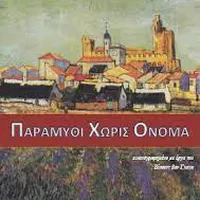Γ’. ΣΤΟ ΦΤΩΧΙΚΟ ΤΗΣ ΚΥΡΑ-ΦΡΟΝΗΣΗΣ (2)
G’|IN THE|POOR HOUSE|||
Γ'. EN LA CASA POBRE DE LA SRA. ALEGRÍA (2)
Γ'. DANS L'HOSPICE DE MME JOY (2)
C. AT THE POOR HOUSE OF KYRA-FRONISI (2)
Η Γνώση γέλασε.
The|Knowledge|laughed
Knowledge se rió.
Knowledge laughed.
— Θες να τις σκοτώσεις ή να τις μεταχειριστείς; ρώτησε.
Do you want|to|them|kill|or|to|them|use|he asked
- ¿Quieres matarlos o tratarlos? preguntó.
— Do you want to kill them or use them? she asked.
— Το ίδιο δεν κάνει;
The|same|not|does
- ¿No es así?
— Isn't it the same?
— Όχι!
No
- ¡No!
— No!
Η ώρα πάντα περνά.
The|hour|always|passes
El tiempo siempre pasa.
Time always passes.
Μ' αν κάνεις περιττά πράματα, τη σκορπάς· ενώ αν κάνεις δουλειές με σκοπό, τη μεταχειρίζεσαι.
if you|if|do|unnecessary|things|it|waste|while|if|do|tasks|with|purpose|it|use
Si haces cosas innecesarias, la dispersas; pero si haces obras con propósito, la utilizas.
If you do unnecessary things, you waste it; while if you do tasks with purpose, you make use of it.
— Δεν το συλλογίστηκα αυτό ποτέ, είπε συλλογισμένο το Βασιλόπουλο.
Not|it|thought|this|ever|said|thoughtfully|the|Prince
- Nunca me lo había planteado, dijo Vasilopoulos pensativo.
— I never thought of that, said the Prince thoughtfully.
Και μένα η ώρα μου φαίνεται ατέλειωτη!
And|me|the|hour|my|seems|endless
A mí también me parece que el tiempo no tiene fin.
And my time seems endless!
— Και όμως η ώρα είναι πολύτιμη, αποκρίθηκε η Γνώση.
And|yet|the|time|is|precious|replied|the|Knowledge
- Y sin embargo, el tiempo es precioso, replicó el Conocimiento.
— And yet time is precious, Knowledge replied.
Σε τι καταγίνεσαι όλη μέρα;
In|what|do you occupy yourself|all|day
¿En qué te pasas el día?
What are you busy with all day?
— Σε τίποτα!
In|nothing
- ¡No puede ser!
— With nothing!
Σε τι μπορώ να καταγίνω; Ο καθένας ζει και καταγίνεται για τον εαυτό του, κι εγώ δεν έχω ανάγκη από τίποτα.
In|what|I can|to|occupy myself|The|everyone|lives|and|occupies himself|for|the|self|his|and|I|not|have|need|from|nothing
¿De qué me puedo quejar? Cada uno vive y para sí, y yo no necesito nada.
What can I be busy with? Everyone lives and is busy for themselves, and I don't need anything.
— Μα ο τόπος σου έχει ανάγκη από σένα.
But|the|place|your|has|need|from|you
- Pero tu país te necesita.
— But your place needs you.
— Μπα!
Oh
- ¡No!
— Oh!
Ο καθένας φροντίζει για τον εαυτό του και κουτσοζεί.
The|everyone|takes care|for|the|himself|his|and|lives poorly
Cada uno se ocupa de sí mismo y cotillea.
Everyone takes care of themselves and is selfish.
— Καλά το είπες, πως κουτσοζεί, αποκρίθηκε λυπημένη η Γνώση.
well|it|you said|that|limps|replied|sadly|the|Knowledge
- Bien dicho, que cotillee, replicó tristemente Conocimiento.
— You said it well, that they are selfish, Knowledge replied sadly.
Και ο τόπος σου κουτσοζεί.
And|the|place|your|is somewhat poor
Y tu lugar es el cotilleo.
And your place is selfish.
Το καταδέχεσαι όμως;
The|you accept|however
But do you accept it?
— Τι να του κάνω;
What|to|to him|do
— What can I do about it?
— Αν ο καθένας σκέπτουνταν λιγότερο το άτομο του και δούλευε περισσότερο για το γενικό καλό, θα έβλεπε μια μέρα πως πάλι για τον εαυτό του δούλεψε, και πως αντί να κουτσοζεί, κατάφερε να καλοζεί.
If|the|everyone|thought|less|the|individual|his|and|worked|more|for|the|general|good|would|see|one|day|that|again|for|the|self|his|worked|and|that|instead|to|barely survive|managed|to|live well
— If everyone thought less about themselves and worked more for the common good, they would see one day that they worked for themselves again, and that instead of just getting by, they managed to live well.
— Δεν καταλαβαίνω, μουρμούρισε το Βασιλόπουλο.
Not|I understand|murmured|the|Prince
— I don't understand, murmured the Prince.
Η Γνώση γέλασε.
The|Knowledge|laughed
Knowledge laughed.
— Σε σκότισα; είπε.
You|confused|he said
— Did I confuse you? she said.
Μ' αν πας πίσω στο λαό σου, και ζήσεις ανάμεσα του, και μιλήσεις μαζί του, και ακούσεις τα όσα έχει να σου πει, θα εννοήσεις τότε καλύτερα.
if|you|go|back|to the|people|your|and|live|among|them|and|speak|with|them|and|hear|the|whatever|has|to|you||will|understand|then|better
But if you go back to your people, and live among them, and talk to them, and listen to what they have to say, you will understand better then.
— Θα πάγω!
I will|go
— I will go!
είπε σοβαρά το Βασιλόπουλο.
said|seriously|the|Prince
said the Prince seriously.
Τα δυο αδέλφια μπήκαν στο μαγειριό ν' αποχαιρετήσουν την κυρα-Φρόνηση, και τη βρήκαν που κοκκίνιζε κρέας στο χαρανί.
The|two|brothers|entered|into|kitchen|to|say goodbye to|her|||and|her|found|who|was rinsing|meat|in the|sink
The two siblings entered the kitchen to say goodbye to old Mrs. Fronisi, and they found her browning meat in the pan.
— Πώς; Δε θα μείνετε να γευθείτε το γιαχνί μου; ρώτησε η γριά.
How|Not|will|you (plural/formal) stay|to|taste|the|stew|my|asked|the|old woman
— What? Won't you stay to taste my stew? asked the old woman.
— Σ' ευχαριστούμε, όχι, είπε το Βασιλόπουλο.
us|thank you|no|said|the|Prince
— Thank you, no, said the Prince.
Βιάζομαι να πάγω πίσω.
I am in a hurry|to|go|back
I am in a hurry to go back.
Η γριά έκοψε ένα μεγάλο κομμάτι ψωμί για τον καθένα και το έχωσε στην τσέπη τους.
The|old woman|cut|a|large|piece|bread|for|each||and|it|stuffed|in the|pocket|their
The old woman cut a large piece of bread for each of them and stuffed it in their pockets.
— Ο δρόμος είναι μακρύς, είπε.
The|road|is|long|he said
— The road is long, she said.
Στο καλό, παιδιά μου.
to|good|children|my
Goodbye, my children.
Αποχαιρέτησαν τη Γνώση, και τ' αδέλφια πήραν πάλι το δρόμο του παλατιού.
They said goodbye to|the|Knowledge|and|the|brothers|took|again|the|road|of the|palace
They said goodbye to Knowledge, and the brothers took the road back to the palace.
Κάθε λίγο γύριζε η Ειρηνούλα να δει το ανοιχτόκαρδο άσπρο σπιτάκι που ξεχώριζε ανάμεσα στα πράσινα δέντρα.
Every|little|turned|the|Irinoula|to|see|the|open-hearted|white|little house|that|stood out|among|the|green|trees
Every now and then, Irinoula turned to see the open-hearted white little house that stood out among the green trees.
Και όταν χάθηκε από τα μάτια της, αναστέναξε βαριά και κοίταξε τον αδελφό της που πήγαινε ίσια μπροστά του, με σταθερό βήμα και με το μέτωπο ψηλά.
And|when|disappeared|from|the|eyes|her|sighed|heavily|and|looked|the|brother|her|who|was going|straight|ahead|him|with|steady|step|and|with|the|forehead|held high
And when it disappeared from her sight, she sighed heavily and looked at her brother who was walking straight ahead, with a steady step and his forehead held high.
SENT_CWT:AFkKFwvL=2.79 PAR_TRANS:gpt-4o-mini=1.47
en:AFkKFwvL
openai.2025-01-22
ai_request(all=45 err=0.00%) translation(all=37 err=0.00%) cwt(all=334 err=2.10%)

